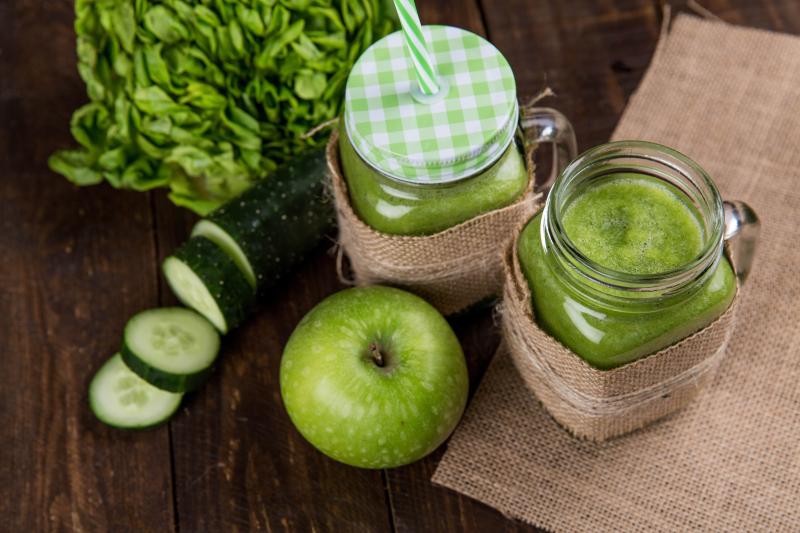Leave spring cleaning for your home! Our bodies are constantly working to rid themselves of toxins and specific organs have the function of efficiently excreting any waste or buildup. The truth behind what detox diets are, why they don't work, and what you can actually do to benefit your body's health.

Sydney Wells, 2020-21 Dietetic Intern
Friday, August 12, 2022
What are detox diets?
There is not one strict definition of a detox diet. Often detox diets consist of low-calorie intake, juices, laxatives, or eliminating certain foods or food groups. These "cleaners" last varying amounts of time; anywhere from a few days up to 21 days.
What are toxins?
Just like detoxifying diets can have a variety of definitions, toxins are also not well defined. Generally speaking, toxins can be pollutants and chemicals, or naturally found substances such as molds. or plant, animal, and food allergens. Although the media portrays all of these substances as bad, it is most often the amount of a substance that can result in harm. As with anything, it's the dose that makes the poison.
There is very limited evidence on detoxifying diets and their effectiveness in helping purify the body of any toxins. Detox diets are difficult to research due to the variety in length and requirements, and the complicated nature of humans. As the area of nutrigenomics grows, we will learn more about the large role genetics can play in our individual health and nutrition. It is also important to note that due to the extreme nature of detoxifying diets they are hard to follow through with, making it difficult to track long-term results.
The media portrays detox diets as a quick fix with big results in weight loss and improved health. It is important to remember that those promoting detox diet products care more about their financial gain than your health and well-being.
It is important to note that a healthy body is already doing the heavy lifting of excreting waste from the body. There is also very limited evidence on supplementing specific nutrients or foods to help your body excrete "toxins" (as opposed to juices/eliminating foods).
Read on to learn about ways to support your body without going to extreme measures or purchasing expensive juices.

Downside of detoxing?
In general, dieting has success rates of only 20%. It is important to note that detox diets are very specific, limiting, and restrictive, making it likely success rates are much lower. If you are considering a detox diet for weight loss benefits there are more effective long-term options available. Intuitive eating or mindful eating are two non-diet approaches that can help identify hunger and fullness cues and improve your relationship with food and your body. By improving your relationship with food and your body, as well as movement and exercise, you can produce long-term health improvements. It is important to focus on improving healthy habits such as including a vegetable with each meal or going on a walk when feeling stressed. Although weight plays a role in health, it is only one piece of the puzzle, and establishing healthful routines is one of the most important steps for long term wellbeing.
Symptoms of detox diets can range from fatigue, headaches, nausea, insomnia, anxiety, and shakiness. Although some advocates for detox diets will claim the side effects are the result of "bad stuff" leaving the body, it is actually a side effect of the diet, i.e. low blood sugar and not meeting your body's nutritional needs.
Long-term effects of detox diets could result in disordered eating, laxative abuse, or electrolyte imbalance such as hyponatremia.
Why detoxing is not necessary:
Your body works together to eliminate toxins using your liver, kidneys, gastrointestinal system, skin, and lungs. The excretion of unwanted substances has different pathways and processes depending on the toxin or waste product. Although only a few toxic substances are shared below there are many ways our bodies work together to rid of other toxic substances.
By sweating, your body releases excess water. salt, and urea. This is why it is important to stay hydrated when sweating in large amounts.
Skin, Liver & Kidneys
Your liver excretes ammonia (the result of protein breakdown) and bilirubin (waste from red blood cells).
Kidneys excrete urea which is also the result of protein metabolism.
Lungs & Gut
By exhaling, your lungs excrete carbon dioxide and small amounts of other gases which are harmful to the body.
Finally, your digestive system rids your body of feces which contains the excreted products from the liver and fibers from foods that are not digestible.

Best way to support your body
There is research that supports certain foods having a positive impact on our body's normal detoxifying pathways. These foods include cruciferous vegetables (such as brussels sprouts, broccoli, cauliflower, cabbage, and arugula), berries, soy, garlic, and spices such as cilantro and turmeric. It is important to realize that it is difficult to conduct very specific research about certain foods due to uncontrollable factors such as gender, weight, and genetics. There could also be synergistic effects when these foods are eaten with meals rather than alone. This means that a meal seasoned with turmeric and garlic may be more effective than taking these foods individually.
For this reason it is not recommended to take "garlic pills." There could also be negative side effects with taking amounts larger than what would be obtained through meals. Overall, the best way to support your health and body in efficiently detoxifying itself is to consume a variety of fruits, vegetables, lean meats, whole grains, and low-fat dairy. MyPlate.gov has great examples of ways to incorporate more fruits and vegetables into meal time.
Properly hydrating your body is also an important factor in helping the liver and kidneys function to efficiently remove any toxins. It is recommended that women have nine cups of water daily while men need around 12.5 cups. Water can be found in many foods like grapes, oranges, carrots, and yogurt which account for almost 20% of hydration needs. You can also try adding lemons, limes, or cucumbers to water to give it a different flavor.
Increase fiber
Fiber has a variety of benefits, including helping us stay regular and feel full for longer. Fiber can be found in an assortment of foods such as beans, peas, lentils, nuts, seeds, fruits, vegetables, and whole grains. Fiber plays a role in our gut microbiota which can be modified based on factors such as diet, disease state, exercise, stress, and environmental exposures. By eating a variety of fiber sources one can find benefits for helping the body's detoxifying organs; skin, liver, kidneys, and gastrointestinal system.
Dump the detox!
Detox diets and toxins have a variety of definitions. Media and marketing glamorize these diets and share convincing claims. However, there is no scientific evidence to back them. The best way to support your body in detoxifying itself is by consuming a variety of nutritious foods and staying properly hydrated.
References
Davisson, L."Cleanse" detoxification diet program In Appalachia: Participant characteristics and perceived health effects.
Gordon, B. How much water do you need. https://www.eatright.org
Grant, D.(1991, July 01). Detoxification pathways in the liver
Hodges. R {2015. June 16). Modulation of metabolic detoxitication pathwavs using toods and tood-derived components
Kieffer. D.(2016, November 10). Impact of dietary fibers on Nutrient management and DETOXIFICATION Organs: Gut. liver, and kidneys.
Klein, A.(2014, December 18). Detox diets for toxin elimination and weight management: A critical review of the evidence.
Obert.(2017.November 091. Ponular weigh loss strategies: A review of four weight loss techniques.



